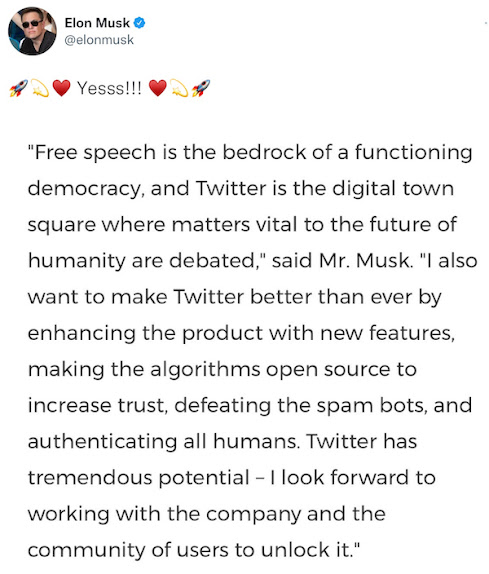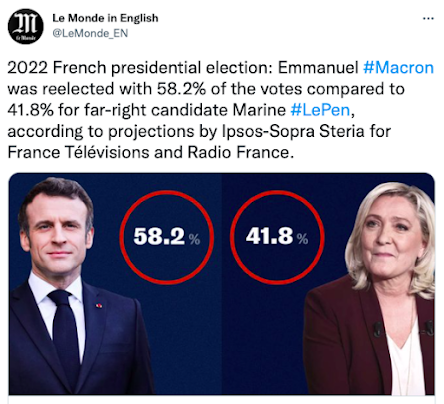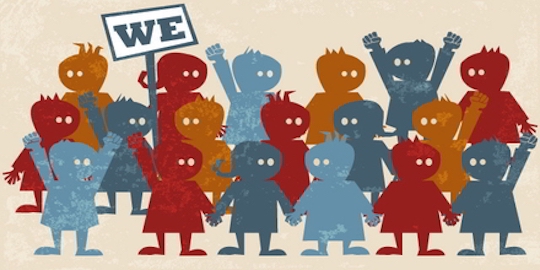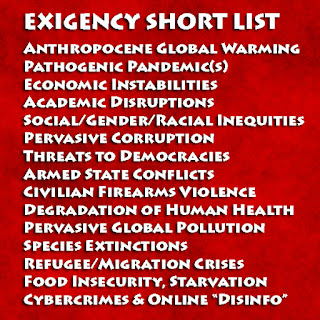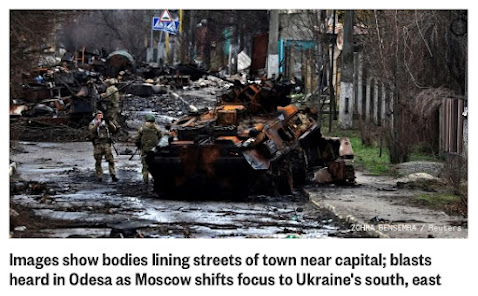Of course, my first response on Twitter was:
Yeah, but not seein' "the End of Western Civilization As We Know it" here.
I must have been out sick the day in grad school ConLaw when they covered "de-facto Public Square" (I cannot locate the words in the Constitution).
Whatever, y'all. Have at it.
BTW: for a serious read on the history of "free speech,"
If Dirck Coornhert, Baruch Spinoza, John Lilburne, Olympe de Gouges, or Frederick Douglass were alive today they would surely declare the twenty-first century an unprecedented Golden Age for free speech. They would marvel at what can be freely discussed openly in real time between people across the globe with no looming Inquisition, Star Chamber, or Committee of Public Safety. No one in the Netherlands bats an eyelid if the doctrines of the Reformed Church are questioned or rejected. Every “free-born Englishman”—regardless of class or religious belief—has a right to criticize the government with no prior censorship or onerous laws against seditious words. In France, women have the same right to “mount the tribune” as men, and political heretics don’t have to fear the guillotine. And in the US, though racism is yet to be defeated, African Americans are no longer “dumb in their chains,” nor can they be silenced by repressive “black codes” or violent mobs acting with impunity.
Given the epic struggles, setbacks, false starts, and enormous sacrifices that led to this happy state of affairs, there is indeed much to celebrate about the current condition of free expression. But the Golden Age of free speech is in decline rather than ascendancy despite the unprecedented ubiquity of speech and information.
In the ninth century CE, Ibn al-Rāwandī could reject prophecy and central doctrines of Islam without serious punishment. But if he were alive today, his life and liberty would be severely threatened in a number of Muslim-majority countries, where blasphemy and apostasy are punishable by death. Even in secular democracies like France and the UK, al-Rāwandī’s radical ideas might well be met with the Jihadist’s Veto.
Gandhi would surely lament that India still uses colonial-era speech crimes to curtail the freedoms of speech and assembly that Gandhi considered the “two lungs that are absolutely necessary for a man to breathe the oxygen of liberty.”
Four decades ago, Western democracies relied on freedom of expression to empower dissidents behind the Iron Curtain, which contributed to the triumph of the Helsinki effect and the end of European communism. Today, the combination of free speech and technology ensuring the free flow of information across borders is increasingly seen as a trojan horse threatening democracy rather than a battering ram knocking down the walls of censorship in closed societies.
At times European democratic leaders have sounded more like a distorted echo of the Soviet apparatchiks who warned against the flood of Western “racism,” “fascism,” and “false propaganda” than the stewards of democracies built upon the central premise of free and open debate for all. Eleanor Roosevelt’s prescient warning that prohibiting incitement to hatred under international human rights law “would encourage governments to punish all criticism under the guise of protecting against religious or national hostility” has been forgotten.
In the US, the robust legal protection afforded by the First Amendment can barely disguise that the underlying assumptions of American “free speech exceptionalism” have lost much of their unifying appeal. As an abstract principle, American faith in free speech remains strong. But the unity collapses along unforgiving tribalist and identarian lines once each side’s sacred taboos are violated by the other side…
Mchangama, Jacob. Free Speech (pp. 383-385). Basic Books. Kindle Edition
Excellent book.
Maybe Musk will make Twitter less toxic, net. Maybe not. Will he make it profitable? I guess we'll see (, moreover, he didn't cut a personal check; this whole deal is leveraged out the wazoo with Other People's Money, collateralized with stock from his other ventures so I have to question the extent of his unilateral whimsical authority).
I mostly have just used Twitter to pimp my blog (it seems to have worked pretty well), and my days are waning in any event, so I could certainly live without social media broadly. And, were Musk to order Donald Trump et al reinstated to Twitter, that might be the day I delete.
NEWS UPDATE
A sharp fall in Tesla’s share price is raising doubts that CEO Elon Musk will be able to go ahead with his $44 billion purchase of Twitter. Tesla fell by 12.2 percent on Tuesday, slashing $126 billion off the market value of the electric automaker. That drop cut the value of Musk’s Tesla stake by $21 billion, which, as Reuters noted, was exactly the same amount he has committed in equity to the Twitter buyout. One analyst said the possibility of Musk selling shares, and becoming distracted by the bid, was causing “a bear festival on the [Tesla] name.” Others said continued falls in Tesla’s share price could jeopardize his funding arrangements. On a bad day for tech stocks, Twitter shares also fell back to trade around 8 percent below Musk’s offer price of $54.20 a share—reflecting fears that the world’s richest man might walk away from the deal. —Daily BeastInteresting.
Where does all of this leave Trump's poignant "Truth Social?"
UPDATE
________

